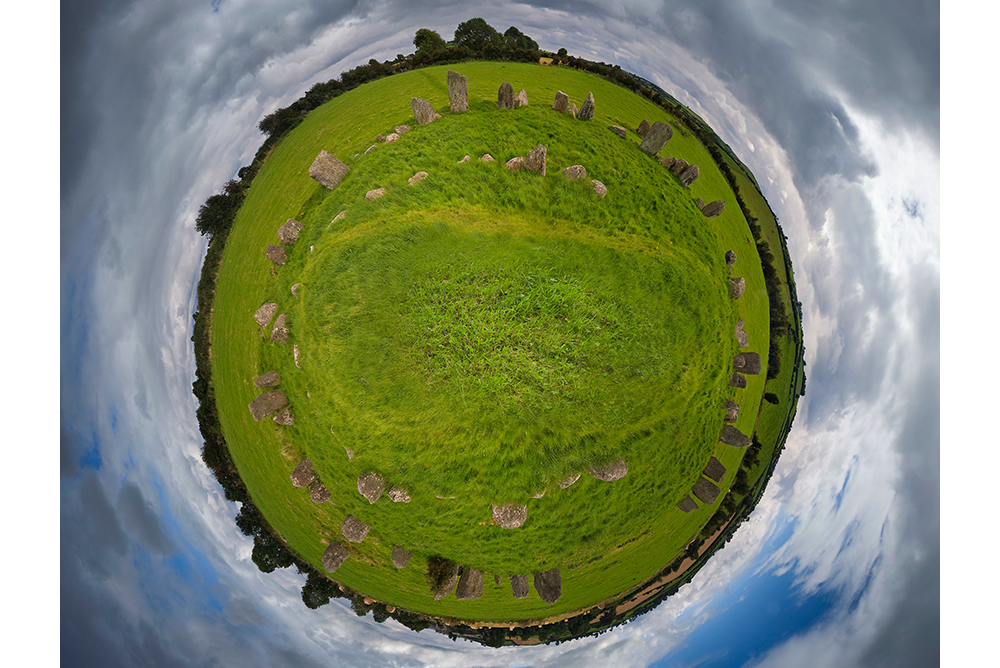
Cropped version of "Ballynoe stone circle planetoid" (photo). Courtesy of philip hay/Flickr (CC BY-NC-ND 2.0 DEED).
1. Christmas Lights
What made it December, in the fields, was that everything
Was silent, except for the ice creaking in every blade of grass,
As if each one had been fastened in place by ropes so tight
None would shift when the Earth spun; or the floorboards
Of the clay were drying out after the autumn rains; but
What had seemed pliable and enduring now so brittle, the tail
Of starlight a child might draw on the sky, or a fox’s bark, might
Finish it off. How were we to know that, every night,
Let someone drop a key on the roadside in a townland miles
Off, or slam a shed door in the middle of the Estate, and each
Time chandeliers would fall from the trees overhead,
The blossom of their aftermath everywhere, but still be restored
Miraculously next morning; the engineers of light and frost at work,
So each tea light, by school-time, would be back again in the branches?
2. The Rest
Even in the empty streets no one patrols,
There is still a sense of the crowd nearby.
On the two hills, the sunlight sits on the markers –
Thousands stacked under on the shelves of the planet,
Each tale a defeat, each life imagining no end of days.
They hang over the town now, heavy as an orchard,
Or shine like conservatories filled with orchid
And with amaryllis, into which they’ve been changed.
Those queuing now in the superstore carparks
Are wheeling their trollies to the cave, where it is cool.
They raise their eyes and watch remote figures move
Among the white stones, like the keepers or guardians
Those who survive are; and as each shadow steps
Between the stone faces and the sun, it is as though
A signal is sent to the rest of us, in pulses of light,
Two words at a time: over and over, your life, your life.
3. Ballynoe Halt
It’s not that it’s not still working. Somehow there are channels
Still driven across the countryside, vectors certainly, directions,
Unusual approaches to destinations no longer reached:
Winter palaces on the outskirts, dachas, tea houses. It is clear
That what has taken place always retains a grip on the present.
The stone circle a little way off still fixes its one good eye
On the heavens, though all who followed the point of its gaze
Are gone; and none stands there now for guidance in the skies,
But it still toils for its keep on the landscape. Just as, at this point
On the line, though you may wait for summer hours, what comes down
The hollowed out funnels where the tracks were, pulling up
With finials, curlicues and gothic balustrades, on slick wheels,
Is now the silence that used to surge back only afterwards,
Powered now by the furious locomotive of grasshoppers.
4. Coastal Erosion
It comes as a surprise that it’s the other way round –
The trees in the hedges are low this far out the lanes, and reel
Backwards in the wind that comes off the sea, shot with salt,
As if a gun has gone off and they are all caught ducking,
Or are walking off quickly in another direction, like the gunman.
What happens is, nothing is given back, but everything is added to
This brusque earth; this vantage point, observation post, these angles.
And nothing whatsoever comes back to the hungry eye; no return
On attention other than the wind rifling through the grasses,
And the light hunting the shadows across the shallow dunes
Which comb over onto the increasingly sandy fields, where,
At places, the fingers of grass claw the whole beach inland, grains
Turning up in fodder and then on living-room carpet tiles in town,
With the vacuum stuttering and the fuselage coughing up glitter.



